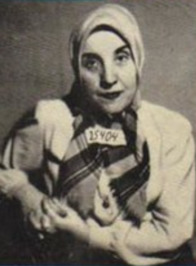Gisella Perl
Born
in Sziget, Hungary
December 10, 1907
Died
December 16, 1988
Genre

|
I Was A Doctor In Auschwitz
—
published
1948
—
14 editions
|
|

|
Riverbank - An imprint of Dev Publishers I Was a Doctor in Auschwitz Gisella Perl
by |
|
* Note: these are all the books on Goodreads for this author. To add more, click here.
“When we came out of the building, we did not know each other anymore. Instead of the exhausted, tortures, but still self-respecting women who entered through its door, we were a heart-rending lot of crying clowns, a ghastly carnival procession marching toward the last festival: death.”
― I Was A Doctor In Auschwitz
― I Was A Doctor In Auschwitz
“One of the basic Nazi aims was to demoralize, humiliate, ruin us, not only physically but also spiritually. They did everything in their power to push us into the bottomless depths of degradation. Their spies were constantly among us to keep them informed about every thought, every feeling, every reaction we had, and one never knew who was one of their agents.
There was only one law in Auschwitz - the law of the jungle - the law of self preservation. Women who in their former lives were decent self-respecting human beings now stole, lied, spied, beat the others, and - if necessary - killed them, in order to save their miserable lives. Stealing became an art, virtue, something to be proud of. We called it “organization”. Those who were working near the crematories had an opportunity to “organize” an occasional can of food, a pair of shoes, a dress, a cooking pot, a comb, which they then sold on the black market operating in the latrine for food, for special favors, and - if the buyers were men - for “love”. … Only the strong, the cruel, the merciless survived.”
― I Was A Doctor In Auschwitz
There was only one law in Auschwitz - the law of the jungle - the law of self preservation. Women who in their former lives were decent self-respecting human beings now stole, lied, spied, beat the others, and - if necessary - killed them, in order to save their miserable lives. Stealing became an art, virtue, something to be proud of. We called it “organization”. Those who were working near the crematories had an opportunity to “organize” an occasional can of food, a pair of shoes, a dress, a cooking pot, a comb, which they then sold on the black market operating in the latrine for food, for special favors, and - if the buyers were men - for “love”. … Only the strong, the cruel, the merciless survived.”
― I Was A Doctor In Auschwitz
“When we entered the first of the filthy rooms inside, we were still human beings, women, wearing our own clothes, our own shoes, our own underwear, and in our hands we still carried the bundle we had brought from home, filled with all that meant so much to us. We still had hair on our heads and most of us even had heads. Above all, we all had our identity, our individuality, which made us different from the other women around us, and our pride, which, as we learned, gets most of its support from outer appearance.”
― I Was A Doctor In Auschwitz
― I Was A Doctor In Auschwitz



















